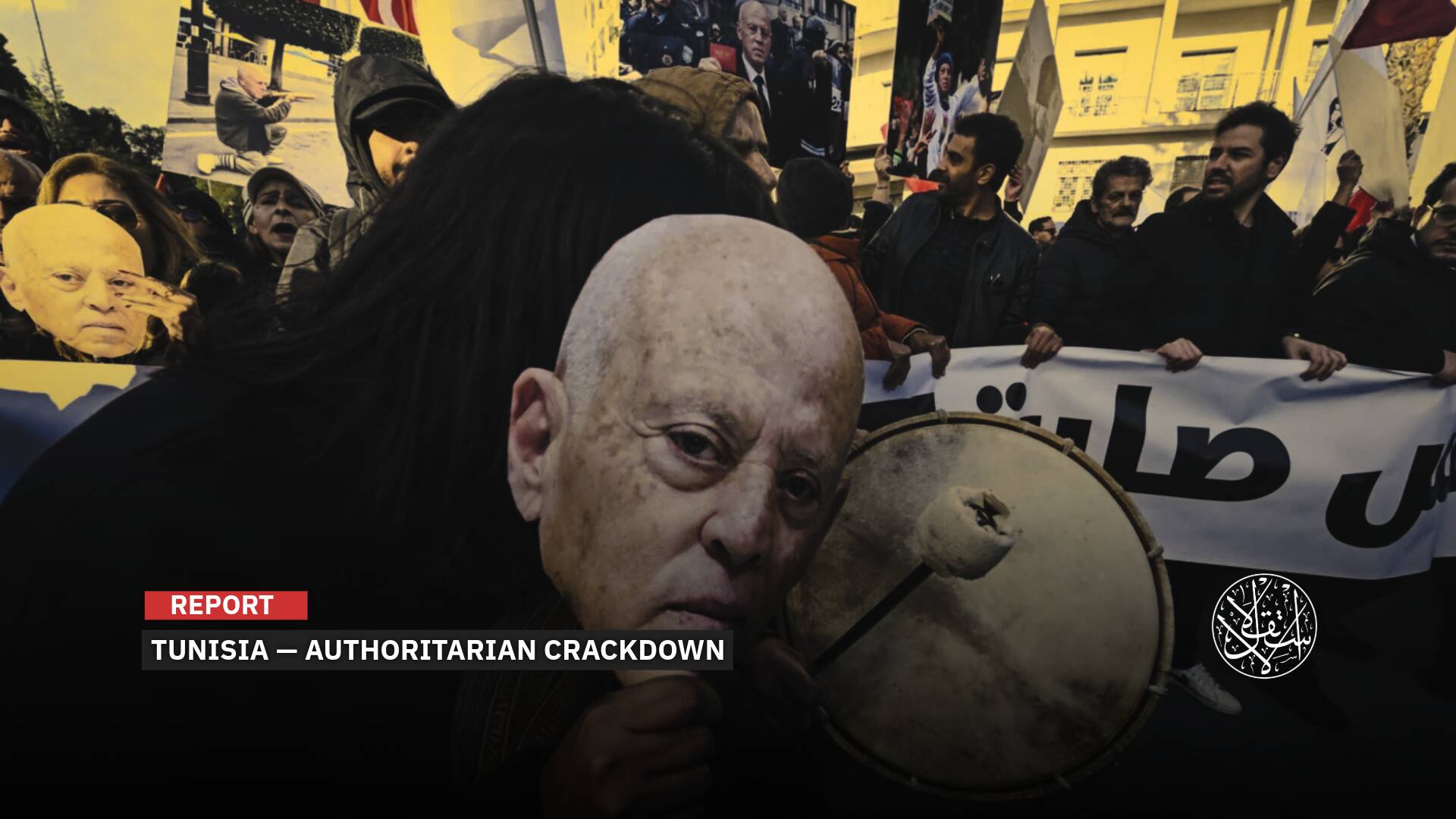A Two-Way Message: What Are the Implications of the US–British Sanctions Against Syria’s Assad and Captagon Trade?

Last week, the United States and the United Kingdom announced the imposition of new sanctions on drug trafficking networks in Syria in a coordinated move, apparently aimed at striking a blow to this trade, which London says generates up to $57 billion for the Assad regime.
The sanctions targeted businessmen, officials of the Syrian regime, personalities close to the family of Syrian President Bashar al-Assad, and two Lebanese people linked to Hezbollah.
These sanctions come at a time when Washington’s calls not to normalize relations with the Assad regime, which has been isolated on the diplomatic scene since the suppression of the popular uprising in Syria in 2011 and the ensuing war, are increasingly receding.
However, since the earthquake occurred in Syria and Turkiye on February 6, several Arab countries have intensified their contacts with the Assad regime and sent aid to its areas of control.
It is noteworthy that last month, three shipments of narcotics and Captagon were seized within one day, on their way to Jordan and the Arabian Gulf, in conjunction with what is being said about an Arab rapprochement with the Assad regime, despite Western sanctions, the Caesar Act, and the Captagon Act.
U.S. Sanctions
On March 28, 2023, the U.S. Treasury Department, in coordination with the British government, issued sanctions targeting senior officials of the Syrian regime close to Bashar al-Assad, and a number of Lebanese people linked to Hezbollah, for their involvement in illegal drug trafficking networks in Syria and Lebanon.
The U.S. Treasury indicated that these sanctions confirm the Assad family’s dominance over the Captagon trade to finance the regime’s criminal machine and shed light on the role of Lebanese drug smugglers, some of whom are linked to the Hezbollah militia, in facilitating the export of Captagon, which generates billions of dollars in profits.
“Syria has become a global leader in the production of highly addictive captagon, much of which is trafficked through Lebanon,” said Andrea Gacki, director of Treasury’s Office of Foreign Assets Control.
“With our allies, we will hold accountable those who support Bashar al-Assad’s regime with illicit drug revenue and other financial means that enable the regime’s continued repression of the Syrian people,” she said.
The sanctions are the Biden administration’s first to target Syria’s Captagon trade and also its first use of the so-called Caesar Act, a law that allows for sanctions on persons or companies that do business with the Syrian government.
Among those identified by the U.S. Treasury’s Office of Foreign Assets Control: Khalid Qaddour, a Syrian businessman who provides financial assistance, technology support, and services to Maher al-Assad (the brother of the Syrian president).
The U.S. Treasury also included Samer Kamal al-Assad on the sanctions list, claiming that he supervises Captagon production facilities in Latakia in coordination with the Fourth Division and some Hezbollah affiliates.
The U.S. Treasury imposed sanctions against Wassim Badi al-Assad, who leads the Ba’ath Brigades militia, a paramilitary unit under the command of Assad’s army, noting that Wassim al-Assad was a key figure in the regional drug trafficking network.
The sanctions targeted Imad Abu Zureik, who currently leads a militia affiliated with the Syrian Military Intelligence and has an important role in enabling drug production and smuggling in southern Syria through the Nassib border crossing between Syria and Jordan.
The sanctions list included a number of Lebanese and their companies, namely Hassan Muhammad Daqqou (a Lebanese–Syrian), who was dubbed the King of Captagon by the media, and his two companies, Hassan Daqqou for Trade and Al-Israa Corporation for Import and Export.
The U.S. Treasury added that Daqqou was linked to drug smuggling operations carried out by the Fourth Division, led by Maher al-Assad, and with the protection of Hezbollah.
The U.S. Treasury also included the Lebanese Noah Zaitar, who has close ties to the Fourth Division and some Hezbollah members, explaining that Zaitar is a well-known arms dealer and drug smuggler and is currently wanted by the Lebanese authorities on charges of drug smuggling.

British Sanctions
In London, the British Foreign Ministry distributed a statement similar to the U.S. sanctions statement, as the British list included 11 names, businessmen, militia leaders, and members of the Assad family, noting that they are linked to the illegal drug trade that helps generate profits for the Assad government.
The British Foreign Office said that 80% of the world’s Captagon market is produced in Syria and that the Assad regime earns up to $57 billion from trading in this type of drug.
SANCTIONED: 11 people involved in trafficking the drug, captagon.
— Foreign, Commonwealth & Development Office (@FCDOGovUK) March 28, 2023
Captagon offers a financial lifeline to the Syrian regime whilst the people of Syria continue to suffer. https://t.co/snNv07fqi3 pic.twitter.com/fyBLMxnBLe
The British list included: Abdellatif Hamid, who was described as a prominent businessman whose factories facilitate the packaging of Captagon pills, and he was linked to the confiscation of quantities of these narcotic substances in Salerno, Italy, in 2020.
It included Mustafa al-Masalmeh, a militia leader in southern Syria linked to the drug trade, and also Taher al-Kayali, a businessman involved in the Captagon trade and shipments of narcotics seized in Europe, as well as Amer Khiti, a Syrian politician who runs multiple businesses in Syria allegedly related to drug trafficking.
The British list also included Mohammed Shalish, who is alleged to be related to the shipping sector in the regime areas in Latakia, in addition to Raji Falhout, whom the British statement described as a militia leader in As-Suwayda, using his group’s headquarters to facilitate drug production.

Geopolitical Objectives
Carolyn Rose, a political analyst at the New Lines Center for Strategy and Policy, said: “The joint U.S.–British sanctions on Assad’s Captagon networks signal a new chapter in transatlantic cooperation and define a new strategy against the Bashar al-Assad regime and Iranian-backed actors in the Middle East.”
Ms. Rose said, in an article published by The Majalla magazine, that the importance of the announced sanctions goes beyond the mere desire of the joint U.S. and British governments to stop this illegal trade, but rather goes beyond it to take broader geopolitical goals into account.
She added that the U.S. and the U.K. have made efforts to highlight the Captagon challenge with regional partners who are pressing ahead with attempts at normalization with the Syrian regime, presenting evidence of illicit sharing between the regime and actors allied with Iran.
The political analyst pointed out that the recently announced sanctions are a warning from Washington and London that they are not considering changing their policy of isolating the Assad regime.
On his part, the political researcher Dr. Radwan Ziadeh, explained in a statement to Al-Estiklal, that the U.S. sanctions are issued according to laws approved by Congress, but the application and strictness in their application depend on the administration.
“Therefore, if the administration does not see any benefit from the laws, it tries to circumvent or postpone them, but it cannot ignore them because Congress will press for their implementation. In any case, the recent sanctions are a strong political message from Washington,” he added.
On the possibility of making a real difference in the Syrian issue through Western and American pressure through sanctions and laws, Dr. Ziadeh indicated that he does not believe that this will happen under the current Biden administration, which is very negative in its dealings with the Syrian file, expecting that this may happen with a new administration in the future.

Credit: Majjala
It is noteworthy that the latest sanctions come less than a week after leading Republicans and Democrats expressed frustration that Biden hasn’t once used the bipartisan Caesar Act to apply economic pressure on the regime’s benefactors.
In a letter to Secretary of State Blinken and Treasury Secretary Janet Yellen, Republican and Democratic MPs noted the disappointingly slow pace of sanctions under the Caesar Act, which they described as a powerful tool to curb regime efforts to rehabilitate or normalize relations with the Assad regime.
As Washington’s regional allies, particularly Jordan, have lobbied Washington to take a more active role in stopping the drug’s spread.
Included in the annual defense policy bill signed by President Joe Biden in December 2022 was the Captagon Act, which requires the administration to develop an interagency strategy to deny, degrade, and dismantle Assad-linked narcotics production and trading networks.
Blinken told a House hearing last week that the administration is developing its strategy and will submit a report to Congress.

Clear Messages
The past weeks witnessed several moves by Arab countries to normalize their relations with the Syrian regime; although this happened in the aftermath of the catastrophe of the devastating earthquake, observers and official statements indicated a new situation that might turn the page on Arab capitals with Bashar al-Assad.
These movements were linked to the UAE, Egypt, Oman, and Jordan, all the way to Saudi Arabia, which is considered the most affected by the Captagon trade and has long announced the seizure of shipments originating from Syria and Lebanon.
Meanwhile, researcher Suhail al-Ghazi considered in a statement to Al-Estiklal that the joint sanctions target the Captagon trade in Syria, adding that it is a message to regional countries about the seriousness of the Captagon Act issued recently by Washington.
“It is also an internal message to congressional figures from both parties about the United States’ intention to work on Syria after these figures’ letter to Biden asking him for more sanctions,” he added.
As for Washington not imposing any sanctions on countries that have normalized their relations with the Assad regime, Mr. al-Ghazi explained that the United States wants to see what these countries can gain from restoring their relations with the regime before it threatens to use sanctions.
The economist and senior fellow at New Lines, Dr. Karam Shaar, considered that the sanctions have a limited but positive impact and send clear messages to countries seeking normalization with the Syrian regime and to current and potential drug producers.
The text of this message, according to what Dr. Shaar said in his tweet, is that Western countries such as Britain and the United States are fully aware of the degree of drug prevalence and the pivotal role of the Syrian regime in it.
US and UK Treasuries sanctioned 12 Syrian and Lebanese nationals today over their roles in the production and smuggling of narcotics.
— Karam Shaar كرم شعّار (@Karam__Shaar) March 29, 2023
The network photo presented here plots them alongside their old and existing connections. This raw data come from our proprietary database at… pic.twitter.com/hSg9zDOQ0D
On February 20, the American website Modern Diplomacy shed light on the Arab movement toward normalization with the Assad regime in an article, considering that the Arab proposal to return Bashar al-Assad to the Arab and international ranks aims to confront Iran’s influence in Syria.
The article added that accepting the proposal by the Syrian regime, the United States, and Europe means starting a political process that could produce a Syrian government less sympathetic to Iran.
The article noted that legitimizing a regime accused of war crimes is a difficult pill to swallow for the United States and European countries.
Last March, Jeffrey DeLaurentis, Washington’s ambassador for special political affairs, told the Security Council that Syrian President Bashar Al Assad’s 12 years of war, abetted by his regime’s mismanagement and corruption, are the obvious cause of the humanitarian crisis in the country.
DeLaurentis accused the Assad regime of never seriously seeking peace and cautioned states that are engaging with the Syrian government to seek verifiably constructive outcomes for Syrians and the broader region.
“The Assad regime’s refusal to participate in meetings of the Constitutional Committee over the last eight months, after nine rounds of meetings where the regime attended but acted in bad faith, is a clear demonstration of Assad’s belief that he can fight, or starve, the Syrian people into submission,” DeLaurentis added.
Sources
- Treasury Sanctions Syrian Regime and Lebanese Actors Involved in Illicit Drug Production and Trafficking
- Tackling the illicit drug trade fuelling Assad's war machine
- Remarks at a UN Security Council Briefing on the Political and Humanitarian Situation in Syria
- Can US-UK sanctions dismantle Syria's drug industry?
- The Case for Normalization with Syria









